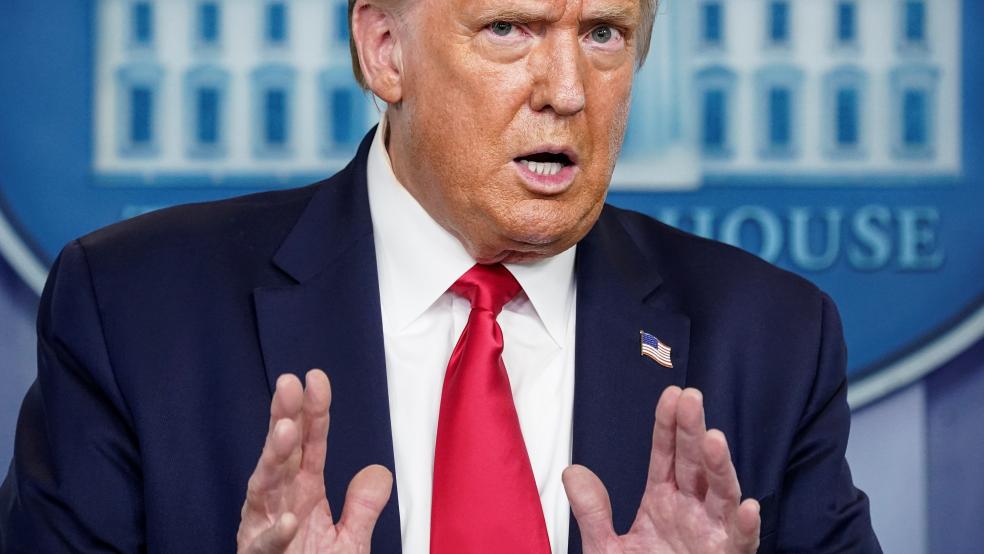The White House and Senate Republicans failed to reach final agreement Thursday on their proposal for a coronavirus relief package, forcing them to delay a planned rollout of the legislation even after administration officials dropped their demand for a payroll tax cut.
Treasury Secretary Steven Mnuchin told reporters that the negotiators had a “fundamental agreement” on a deal but that the legislative text of the proposal still had to be finalized. Other policy disputes reportedly had yet to be hashed out as well, with differences over the extension of federal unemployment benefits a primary sticking point.
Speaking from the Senate floor on Thursday afternoon, Senate Majority Leader Mitch McConnell said that Republicans had “assembled the framework” of their package but that the administration requested additional time to review the details. “We have an agreement in principle on the shape of the package,” McConnell said, adding that Republicans would lay out their plan in a series of bills “early next week.”
In an indication of the fragile state of negotiations, the White House had earlier floated the possibility of breaking the package into smaller bills focused on just three elements: keeping enhanced unemployment benefits in place, funding for school reopenings and protecting businesses against coronavirus lawsuits. That idea was shot down quickly by both parties. “No, no, no,” House Speaker Nancy Pelosi said. “This is a package. We cannot piecemeal this.”
The Washington Post reported that the White House also complicated the talks by renewing a push for language related to the location of the Federal Bureau of Investigation building in downtown Washington, D.C., which is catty-corner from the Trump International Hotel. “It was unclear what this had to do with the coronavirus. A White House spokesman declined to comment,” the Post reported.
The GOP scramble leaves the fate of the broader deal — and the $600 weekly unemployment benefits that have provided a lifeline for millions of Americans — still in some doubt. Politico’s John Bresnahan and Marianne LeVine called the GOP delay “an embarrassing setback that could have serious consequences for millions of unemployed Americans.”
The key parts of the GOP plan: We'll have a more complete breakdown once the plan is released, but the emerging proposal, expected to come in at a cost of about $1 trillion, is reportedly set to include another round of $1,200 stimulus checks just like those provided in March. It would also replace the expiring unemployment benefits with scaled-back payments equivalent to 70% of workers’ previous wages, which reportedly would work out to roughly $200 a week. And it would provide $105 billion for education, including $70 billion for elementary and secondary schools, with half of that tied to schools reopening classrooms. Of course, it would also include the liability shield for businesses.
The plan would not provide large-scale aid for state and local governments, but would allow them more flexibility in using the $150 billion allocated in March and add $16 billion in new funding to improve coronavirus testing. The Paycheck Protection Program of loans to small business would reportedly receive another $90 billion.
Roll Call reports that the plan would also set up "rescue committees" charged with overhauling the government’s Medicare, Social Security and highway construction trust funds.
No payroll tax cut: The White House dropped its demand to have a payroll tax cut included in the package after the idea met continued resistance from key Senate allies. “The president is very focused on getting money quickly to workers right now, and the payroll tax takes time,” Mnuchin told reporters. He said the administration still believes the tax cut is a “very good pro-growth policy.”
The president had been pushing for the cut and had said in an interview on Sunday that he would consider not signing the relief bill if it didn’t include the tax cut. In a tweet Thursday, Trump tried to lay the blame for the tax cut being dropped at Democrats’ feet: “The Democrats have stated strongly that they won’t approve a Payroll Tax Cut (too bad!). It would be great for workers. The Republicans, therefore, didn’t want to ask for it. Dems, as usual, are hurting the working men and women of our Country!” But The Washington Post reports “it was Republicans who actually shot the idea down.”
Mnuchin told CNBC that there could be still another coronavirus relief package that might include a payroll tax cut. Senate Majority Leader Mitch McConnell has said this package will be the final one to address the pandemic.
This was supposed to be the easy part: Republicans haven’t even started to negotiate with Democrats, and the two sides remain trillions of dollars apart. The GOP’s inability to reach consensus on their proposed starting point for those talks doesn’t bode well for that next stage, which is likely to be even more challenging.
Democratic leaders blasted the Republicans for their failure to come together on a proposal and for failing to provide funding for food assistance, rental assistance (as a federal eviction moratorium is set to expire), more aid to state and local governments or hazard pay for essential workers, among other elements.
“They have been so divided, so disorganized, so unprepared that they have struggled to even draft a partisan proposal within their own conference,” Senate Minority Leader Chuck Schumer (D-NY) told reporters, noting that he and Pelosi had urged their counterparts to start negotiations weeks ago. “Even after all this time, it appears the Republican legislative response to Covid is un-unified, unserious and unsatisfactory.”




